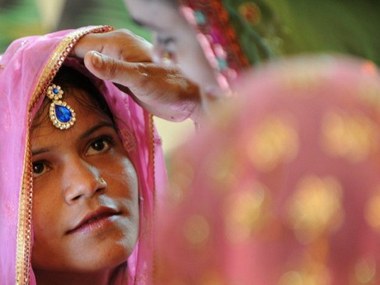The BJP and the Sangh Parivar are kicking up a big fuss over “Love Jihad”. They should pipe down. Not only will they be heating up an already communal atmosphere, they are also on the wrong track. Leaving aside some anecdotal incidents of inter-communal love and conversions to Islam resulting from these liaisons, the fact is if ‘Love Jihad’ is actually an organised system to obtain converts, it is a sign of desperation in those seeking to use this route to change demography. I propose to explain why through some hypotheses. First, ‘Love Jihad’ is a very inefficient and costly way to seek conversions. To make it viable you need a sufficient number of youth willing to sacrifice their time and energies to wooing members from another community - not just for a sexual fling, something men are always willing to expend energies on, but a long-term investment like marriage. Even if one assumes that the wooer is going to desert or contract another marriage of his choice post-conversion, such things cannot remain covert. They will excite community reaction - which then slows down the process of further conversions. [caption id=“attachment_1683971” align=“alignleft” width=“380”]  AFP[/caption] ‘Love Jihad’ will thus ultimately be self-defeating. Worse, it is an indirect acknowledgement by the community seeking converts that normal methods of conversion - marketing propaganda, popularisation of good practices, and promises of spiritual and economic inducements - cannot work anymore. It is interesting to note that the phrase Love Jihad originated in Kerala, where communal demography is moving towards a balance where conversions are both more difficult and costlier for all communities. The Kerala religious demography is roughly 55:45, with Hindus at 55 percent and Muslims and Christians together accounting for the balance (roughly 25:20 between Muslims and Christians). At 55:45, Hindus would have lost sufficient numbers over the centuries and will now be close to acquiring “herd immunity” to further conversions. “Herd immunity” is a term the medical community uses in the context of epidemics. New diseases (ebola, swine flu) have a tendency to spread faster in the initial stages than later, when significant numbers have already contracted the disease. When the bug or virus initially infects individuals, the number of potential additional people to infect is larger, and so the chances of transmitting the disease are greater. Once many people contract it, the number of potential targets falls, as the weaker members die, the stronger ones survive, and the balance population becomes resistant to it or is less likely to come in contact with an infected person. Herd immunity is lowest for small and homogenous communities, and higher for very large, but diverse, populations with genetic variations. Herd immunity is also lower for very large, but monocultural, communities (as in China and Japan). In India, despite diversity, herd immunity among Hindus has reduced of late due to the homogenising effects of urbanisation, globalisation, and the reduction of casteism. The absence of herd immunity explains (partially) why Islam conquered small, homogenous tribal communities in the Middle East in its earlier centuries, sometimes even overwhelming entire nations with not-so-large populations. It also explains why small tribal communities in the north-east have completely turned Christian over the last two centuries even while the bulk of caste-based Hindudom has not. However, herd immunity has not been achieved is large swathes of the diverse Hindu population in various parts of the country, and this is why Islamic and Christian evangelical groups are more successful in gaining faster conversions outside Kerala - in Tamil Nadu and parts of Andhra Pradesh, for example. The potential market for conversions is so huge that normal techniques for conversions work quite well. There is absolutely no need for deploying Love Jihad, which is a costly weapon and unwieldy to use. In Kerala, where herd immunity is being achieved, the desperate measure of Love Jihad may have some takers but not elsewhere. In is interesting to note that both Hindu groups and the church have raised concerns about Love Jihad in Kerala. So one cannot dismiss the idea altogether. But Love jihad as a purely male appropriation of women from other communities into theirs cannot work over the long term unless there is a reverse process also at work: Muslim women enticing men (the so-called “honey trap”) from other communities into marriage and conversion. If too many Muslim men marry outside their existing patriarchal hunting grounds within the community, the result will be a shortage of Muslim grooms - even assuming some amount of bigamy is permitted in Islam. In fact, the reverse Love jihad, where females entrap males from other communities, is actually more feasible for the simple reason that men are less choosy - and actually make patriarchal gains if they marry Muslim women (as this blog in Reality Check India argues). This is because we know that women are more careful in picking male partners than men for biological and evolutionary reasons. Acecdotally, too, I have heard of more Hindu men willing to convert to marry Muslim women or even to marry twice. I know of one senior editor who converted to Islam to marry a second time when the earlier spouse would not offer an easy exit. But honey traps too suffer from the same limitations of men entrapping women: it demands too high a personal price from the women concerned, and moreover will ultimately be opposed by conservative Muslim society if carried out on a scale where demographics are altered significantly. Net-net, I believe that Love Jihad - apart from being a contradiction in terms, is improbable except at the margin. It is a possibility -but not a probability - in states like Kerala and Assam, where demographic realities have reduced the Hindu proportions, enabling them to be more resistant to conversions. They may be close to achieving herd immunity. The reasons why conversions are a big issue with Hindu groups are two-fold. One, since Hinduism does not believe in conversion and has, therefore, not developed a well-organised, institutionalised system for expansion of the faith like Islam and Christianity, some Hindus want conversions banned. But this is anti-freedom and not acceptable in our pluralistic society. Two, there is a sense of greater vulnerability since herd immunity has not been achieved in large parts of India. Banning conversions is actually an acceptance of defeat. Those who care about conversions away from Hinduism thus need a different strategy - which I don’t propose to discuss in detail here. The key elements of this strategy are obvious, though: one is to solidify Hinduism internally by making Hindutva a social movement about eliminating caste rigidities rather than being anti-other religions. The other is to create a long-term plan for expansion and conversion in virgin markets like the Americas, Europe, south-east Asia and Africa. Remember, just as Hindus don’t have herd immunity in India, Christians don’t have herd immunity in the areas they dominate. They are as vulnerable as Hindus in India to conversion. The communities most vulnerable to Hinduism and Buddhism are the Islamic world - which has no herd immunity whatsoever even though there are more than 50 countries professing Islam as a religion. Banning conversions and apostasy is a sign of extreme herd vulnerability.
Net-net, I believe that Love Jihad - apart from being a contradiction in terms, is improbable except at the margin.
Advertisement
End of Article
Written by R Jagannathan
R Jagannathan is the Editor-in-Chief of Firstpost. see more


)

)
)
)
)
)
)
)
)



